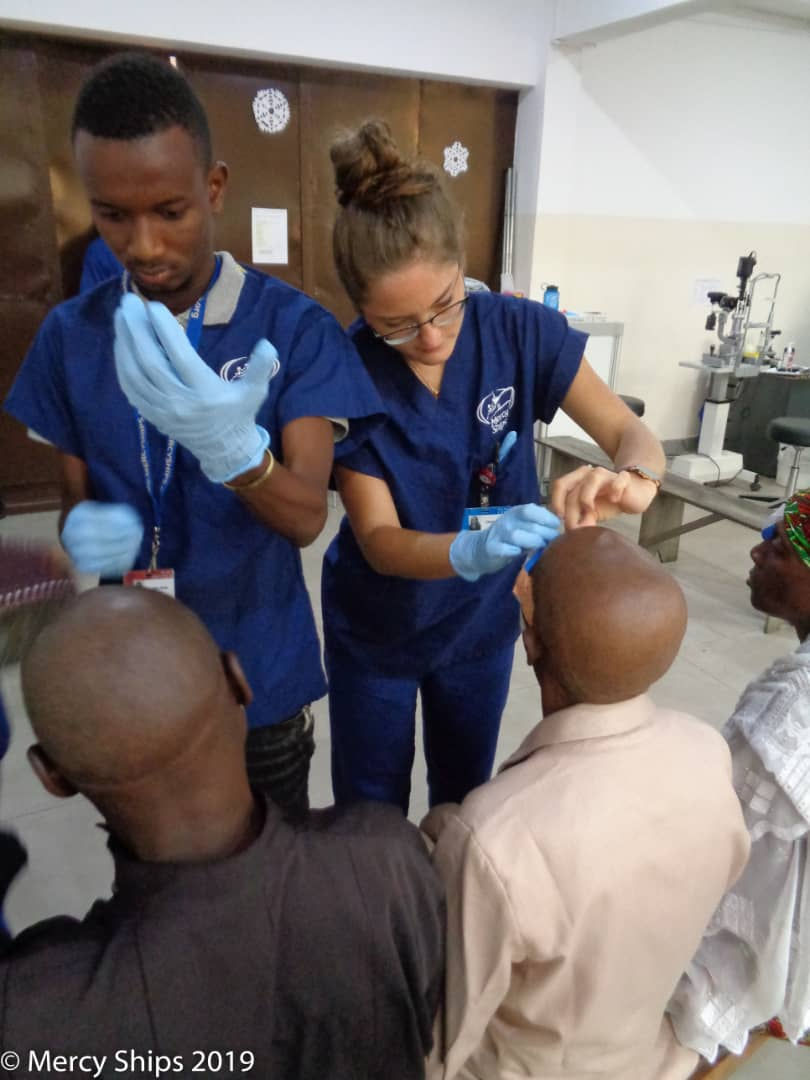Author: Boubacar Talibe Balde
Editors: Joanna Ashby & Jackie Corley

From last August, the Africa Mercy (AFM) has parked in the port of Conakry, Guinea, bringing hope and healing to the forgotten poor of this nation. I, as a Guinean young man, am willing to serve my own people, and I have had the opportunity to be one of the day workers onboard the ship. You should know, the ship is a floating village.
My first time getting inside the ship was such a great moment - I felt a kind of electricity and feeling that I was going to have one of the most impacting experiences in my life. It is true, you have to trust me that the work in there is just wonderful. The people are joyful, everyone is smiling at you at any moment and everything is very well organized. My main role on the ship was being a translator from English to French and other local languages such as Susu, Fulah and Mandingo. Since everyone has a team, the team that I was allocated to work with was the "Eye team".

The "Eye team", as we always say in the clinic, is a blessed team. I have been working with this group since August and I spent a lot of my time working in the clinic. Everything starts with screening of the patients in the "palais du peuple" of Conakry, the capital of Guinea. That was on August 28, early in the morning and it lasted all day long. We saw more than 6,000 people over the whole day of screening and more than 2,000 of them were there for conditions relating to the eyes. That day I would say that I talked to as many as 1,000 people. Seeing those people there that day was heartbreaking for me: I would have never imagined that all these people lived in my country and needed help for all these health issues. The day was long and memorable for me.
In the eye team, we only do cataract surgery in one eye, so for a patient to be selected and booked for surgery, they have to have very mature cataract in both eyes. There is nothing harder than telling a patient that they do not meet criteria for surgery on Mercy Ships. It always makes sad to see them go home disappointed because you feel like you have taken their hope away from them. Overall, I saw many patient cases, many diseases and many eye problems throughout the screenings I have been a part of with Mercy Ships. By the end of February, we had booked more than 1,000 patients for surgery.

When I think about some of the most memorable moments I have had on the ship, I get so emotional. Some patients have reduced me to tears. There was one patient who had lost her sight for years. The day after surgery, when her patch was removed, she yelled out in happiness and was so grateful. She cried because she was now able to see. I got shivers all over my body because I was so moved by that emotion. I feel so privileged to have the opportunity to share these life-changing moments with the patients. When we check-in with patients again at the 6-week follow-up, we all celebrate and we always join the patients as they sing and dance with happiness.
The eye team also does cataract surgery for children. For this case, we do the surgery on both eyes as these patients are so young. The youngest patient I can recall is a 3-months old who was sent to the screening by her parents. It breaks my heart to hear about these children - who have their whole lives ahead of them, with so much potential - who are forced to live in darkness because of eye diseases that are preventable through timely surgical care. This year, 36 children underwent cataract removal surgery on the ship. After the surgery, when all the post-operative follow-ups are complete, we all feel a fresh beat in our heart when we see the parents smiling. For the parents, it is freedom that has been given to their children. For the children, they have been given their vision back, so they will now be able to return to school and pursue their dreams in life. On behalf of one of the teams that help within this process, I can say that we feel that it is an honor to be part of this story and that is a privileged act of humanity.

Everyone around the world needs health care but those who are poor are often the ones who suffer the most because they cannot access it when needed. I know that it is not possible to help everyone, but every person counts and every effort to improve things is worth trying. In this piece I have just painted a picture of the situation in Guinea, I cannot imagine the millions of people who need health care and essential surgery around the world. But I am sure of one thing, I do not intend to stay inside an office and watch people suffer and die. I will do something to offer my help and I will always be motivated by the opportunity to try my best to support others who are in need. For my people, I will always act with humanity.

About the author:
I am Boubacar Talibe Balde. I am 22 years old and I am a Guinean. I completed four years of university last year and I studied Management & Computing. I speak French, English and a little German. I love writing, it is my favorite hobby. I work on the Eye Team on the Africa Mercy. I recently worked as a translator on a research project which involved working with fellows from the Harvard Program in Global Surgery and Social Change (PGSSC).
![GHSM Program Glob Surgery & SC[55].png](https://static.wixstatic.com/media/d9a674_5124acb089954170bbd1c7f2813a923f~mv2.png/v1/fill/w_448,h_97,al_c,q_85,usm_0.66_1.00_0.01,enc_avif,quality_auto/GHSM%20Program%20Glob%20Surgery%20%26%20SC%5B55%5D.png)
Comments